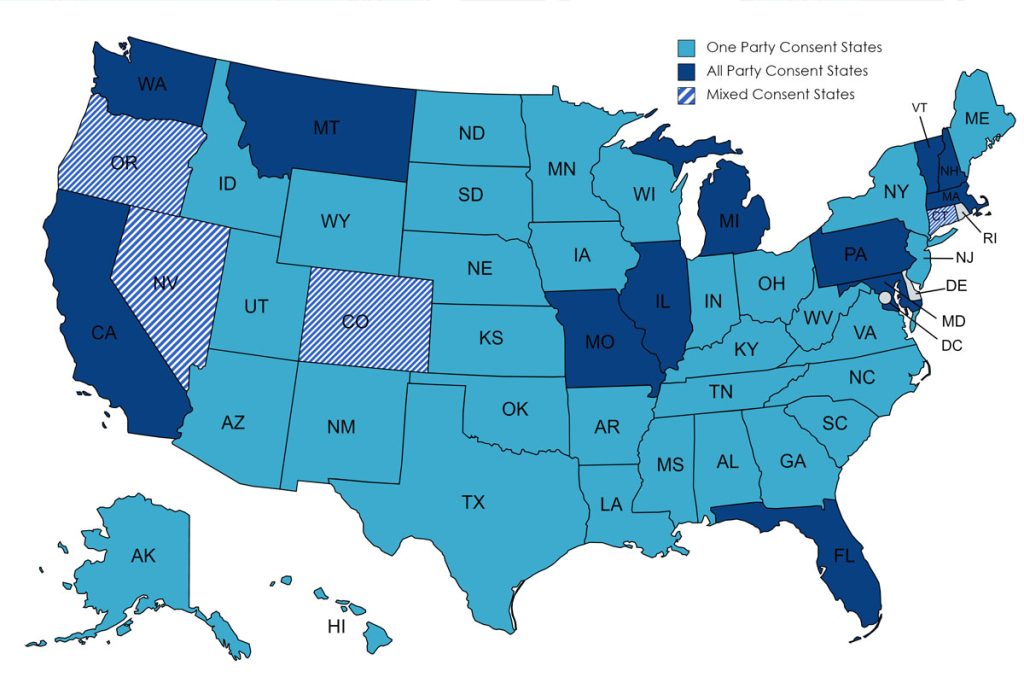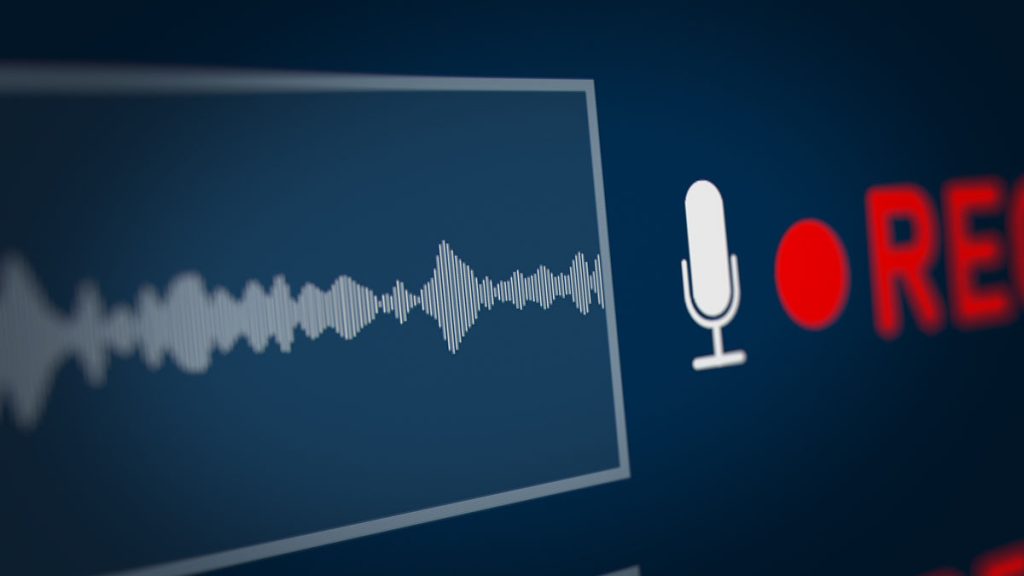

Technology has made it easier than ever to record someone, but although it may be simple…it’s not always legal. In the United States there are 13 states that have some form of All Party Consent laws codified, however, 3 of these states also have some instances where one party consent is applicable. Skip to a table of All Party Consent States.
In Two-Party (or all-party) consent states it is required by state law that all parties that partake in a conversation must have given consent for that conversation to be recorded when there is an expectation of privacy. This law covers private as well as public places, if there is an expectation of privacy, consent must be given. Generally, a video may be recorded in public places with the caveats that your video does not capture the audio or subject of the conversation, and the people are speaking in a public place. Check your state’s individual recording laws for more information.
Note- If someone is on your property recording without your permission it is usually most efficient to charge them with trespassing instead of debating the legality of recording.
RecordingLaw.com prefers to err on the side of caution with some of the states marked with a * as they have special provisions that could be interpreted differently depending on each case.
Make sure to read the state rules, for a short summary view the chart below, to read more in-depth analysis click through to the specific page.

Click to read more about one party consent states

If you are a third-party and require consent from the parties taking part in the conversation, the Federal Communications Commission (FCC) states that you may gain consent to make a recording by:
| State | Simple Terms | Law |
|---|---|---|
| *Connecticut Recording Laws | Connecticut can be considered as both a one party state and two party state. This is because there are different laws for in-person conversations and telephone conversations. Read on for more information. | Conn. Gen. Stat. § 53a-187(a)(2), Conn. Gen. Stat. § 52-570d(a) C.G.S.A. § 52-570d |
| California Recording Laws | It is a criminal offense to use any device to record communications, whether they’re wire, oral or electronic, without the consent of everyone taking part in the communication. This means that in California you are not legally allowed to record a conversation you are taking part in unless all parties are in agreement. However, one exception allows that if a conversation taking place in public, within government proceedings, or under conditions where one could be easily overheard is recorded, this cannot be punished under California’s eavesdropping statute. Cal. Penal Code § 632. California also has unique laws as it pertains to the entertainment industry and paparazzi. | Cal. Penal Code § 632, Cal. Civil Code § 1708.8, Cal. Veh. Code § 40008, Kearney v Salomon Smith Barney Inc, |
| Delaware Recording Laws | It is a criminal offense to use any device to record communications, whether they are wire, oral or electronic, without the consent of all parties taking part in the communication. This means that in Delaware you are not legally allowed to record a conversation you are taking part in unless all parties are in agreement. Del. Code Ann. tit. 11, § 1335(a)(4). |
| State | Simple Terms | Law |
|---|---|---|
| Michigan Recording Laws* | On the surface it appears that Michigan is an all party consent state, but previously a Michigan court has ruled that the definition of the word 'eavesdrop' inherently refers only to overhearing or recording private conversations (snooping) | Mich. Comp. Laws § 750.539c, Sullivan v. Gray (1982) |
| Montana Recording Laws | Montana recording law stipulates that it is a two-party consent state, excluding some specific situations. In Montana, it is generally a criminal offense to use a hidden device to record oral or electronic communications without the consent of all contributing parties. Mont. Code Ann. § 45-8-213 (2011). This means that in Montana you are not legally allowed to secretly record a conversation unless all parties are in agreement, but in some situations recordings can be made without consent as long as this is not done covertly. This means that although consent is not required, all parties must be notified that the conversation is being recorded. | Mont. Code Ann. § 45-8-213 (2011) |
| New Hampshire Recording Laws | New Hampshire recording law stipulates that it is a two-party consent state. In New Hampshire, it is a criminal offense to use any device to record communications, whether they’re wire, oral or electronic, without the consent of everyone taking part in the conversation. This means that in New Hampshire you are not legally allowed to record a conversation you are taking part in unless all parties are in agreement. However, the offense is considered a misdemeanor instead of a felony if the perpetrator contributed to the communication in question or received the prior consent of one party to the recording. N.H. Rev. Stat. Ann. § 570-A:2 (2012). | N.H. Rev. Stat. Ann. § 570-A:2 (2012). |
| Oregon Recording Laws* | Oregon Law is mixed. For in person oral recordings it is required to have consent from all parties, whereas for digital communications it is effectively a one party consent state where you are only required to have the consent of one party. | Rev. Stat. Ann. §§ 165.535, 165.540, |
| Pennsylvania Recording Laws | Pennsylvania recording law stipulates that it is a two-party consent state. In Pennsylvania, it is a criminal offense to use any device to record communications, whether they’re wire, oral or electronic, without the consent of everyone taking part in the conversation. This means that in Pennsylvania you are not legally allowed to record a conversation you are taking part in unless all parties are in agreement. 18 Pa. Cons. Stat. Ann. § 5704 (West 2012). | 18 Pa. Cons. Stat. Ann. § 5704 |
| Washington Recording Laws | It is a criminal offense to use any device to record communications, whether they are wire, oral or electronic, without the consent of everyone taking part in the conversation. | Wash. Rev. Code Ann. § 9.73.030 (West 2012). |
If you're interested in privacy, check out our blog post on using VPN's, one of the best ways to protect your privacy on-line.